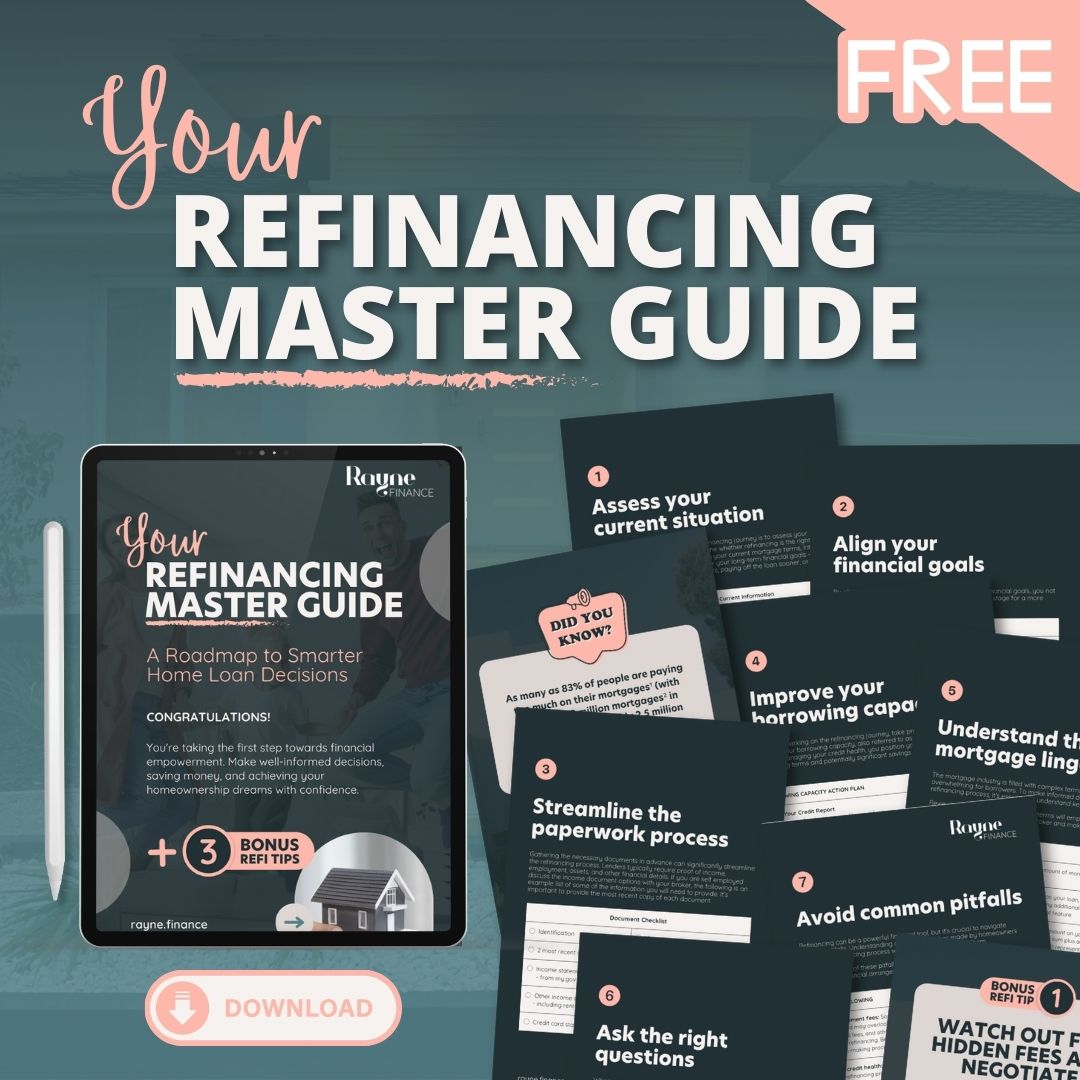As a homeowner with a mortgage, chances are you’ve heard of the term ‘refinancing’. But what does mortgage refinancing mean and how can it work for you?
Refinancing involves reviewing your current mortgage, and potentially swapping your loan to another lender, who can better meet your current needs, wants and circumstances.
Refinancing can be a strategy to secure a lower interest rate, switch to a different type of loan and can also allow you to consolidate your debts or pay down your mortgage more quickly.
Another common reason borrowers look to refinance is to access equity – the amount you’d get from selling your home after settling any associated loans and any other costs associated with the property.
However, refinancing isn’t suitable for everyone. There are many different factors you’ll need to consider when thinking about refinancing a loan.
So how will you know that refinancing is the right option for you?
The first step is to speak to a professional, such as a mortgage broker, about your needs, objectives, current financial situation and whether you can afford a different loan structure, particularly if you have more than one property.
Are you looking to pay less interest?
If your purpose of refinancing is to aim for a lower interest rate, this could potentially save you a lot of money in the long-term.
While saving money is often one of the biggest benefits of refinancing, it may not be as straightforward as that and careful consideration is required.
Sometimes refinancing may only save you a small amount per year, particularly when you take into consideration any exit costs, application fees and taxes involved. Refinancing may also not offer benefits if the loan will attract Lenders Mortgage Insurance (LMI) or features like an offset account aren’t offered with the new loan.
However, if it’s going to save upwards of $1,000 a year, refinancing might be a sensible approach.
At this point, the broker will need to find out about your existing loan, repayments and current loan structure.
Your mortgage broker will also need to find out more about your current financial situation, including your income, any other current debts and about any assets you own.
The current value of the property is also taken into consideration, your broker will have access to current data that will indicate what your property is likely to be worth.
The broker will then review the various loan options and figure out whether it’s worth it for you to refinance.
Your mortgage broker can tell you if getting a lower interest rate from your current lender can be achieved without refinancing.
Do you want to change your loan type?
Refinancing may allow you to change to a different loan type, for example switching from a variable loan to an interest only loan.
If you do decide to go down the refinancing path, working with a broker rather than going straight to a lender has advantages.
Brokers generally have access to loan options from a range of different lenders and if there’s a better opportunity for you, they’re usually able to access it.
Do you want to consolidate your debts?
If you want to refinance to lower lending costs to help you manage your monthly repayments, speak to your mortgage broker who can negotiate with your current lender for a rate suitable to your current situation.
Your broker can also help you look at alternative options to consolidate your personal loans and credit cards into the one loan. This could help you in lowering your monthly repayments, or help you keep your repayments on time, and even save you interest in the long term.
Licensing statement: Rayne Finance ABN [70 605 100 838] is authorised under LMG Broker Services Pty Ltd Australian Credit Licence 517192. Disclaimer: (1) As with any financial scenario there are risks involved. This information provides an overview or summary only and it should not be considered a comprehensive analysis. You should, before acting in reliance upon this information, seek independent professional lending or taxation advice as appropriate and specific to your objectives, financial circumstances or needs. This publication is provided on the terms and understanding that: (2) LMG Broker Services Pty Ltd, Rayne Finance (Seed Lending Pty Ltd) and the authors, consultants and editors are not responsible for the results of any actions taken on the basis of information in this publication, nor for any error in or omission from this publication. (3) LMG Broker Services Pty Ltd, Rayne Finance (Seed Lending Pty Ltd) and the authors, consultants and editors, expressly disclaim all and any liability and responsibility to the maximum extent permitted by the law to any person, whether a purchaser or reader of this publication or not, in respect of anything, and of the consequences of anything, done or omitted to be done by any such person in reliance, whether wholly or partially, upon the whole or any part of the contents of this publication.
Explore other FAQs and Facts
What the federal budget means for buying property
The 2025 federal budget introduces key measures affecting home buyers, including an expanded Help to Buy scheme, increased infrastructure investment, and incentives to grow the construction workforce. Foreign investors face new restrictions, and funding for prefabricated homes aims to accelerate supply. These changes could significantly reshape Australia’s property market.
Own your debt before it owns you
Here’s the hard truth: If you’re not in control of your debt, it’s controlling YOU.
Debt doesn’t just sit quietly in the background. It piles up, creeps into your financial freedom, and slowly starts calling the shots. It’s time to flip the script.
Find out how taking control of your debt can restore your financial freedom and bring peace of mind.
Rental growth slows as affordability is stretched
Rental growth slowed in 2024, despite the national median rent rising 4.8% for the year. Affordability pressures led renters to form larger households, easing demand. Meanwhile, increased investor activity added supply, lifting vacancy rates slightly to 1.9%. Still, with rents rising and vacancies low, many investors remain in a strong position.
Is the property downturn already over?
Australia’s property market rebounded swiftly in early 2025, reversing December’s brief price decline. Growing expectations of interest rate cuts have boosted confidence, while constrained housing supply continues to drive long-term price growth. With construction delays and undersupply persisting, the market’s dynamics are shifting toward sustained appreciation, rather than traditional boom-and-bust cycles.
Rates are on the move.
Are you getting the best deal on your mortgage?
The Reserve Bank of Australia’s recent cash rate cut presents an opportunity for homeowners to reassess their mortgage. With rates heading downward, it’s the perfect time to refinance, consolidate debt, or increase repayments to pay off your loan sooner. Take control of your financial future and explore your options now.
How to buy a property when you’re self-employed
Securing a home loan when you’re self-employed can be challenging, as lenders often view your income as less predictable and your financial position more complex. Strengthening your finances with stability and transparency can improve your chances. This article shares practical tips to help you secure better loan options, lower rates, and more lender interest.
The pros and cons of paying for LMI
(lenders mortgage insurance)
Lenders mortgage insurance (LMI) often gets a bad rap, but it can open doors for borrowers with smaller deposits. While LMI adds costs, it enables buyers to enter the property market sooner, potentially avoiding years of savings and rising property prices. Understanding LMI’s role is key to making informed decisions.
How to prepare for buying an investment property
Thinking about buying an investment property in 2025? The key to success starts with making yourself as creditworthy as possible. From increasing savings to understanding loan options and deposit requirements, there’s a lot to consider. Here’s how to set yourself up for a strong start.
2025 Money Moves:
Tips for Homeowners, Buyers, and Business Owners
The new year presents an ideal opportunity to reassess your finances. Whether you’re planning to buy property, managing a home loan, or running a business, there are key actions you can take to improve your financial situation. From enhancing your credit score to exploring refinancing options, small changes can make a big impact.
How the property market looks as we head into 2025
Australia’s property market is shifting, with a clear divide between strong and weak performers. While Brisbane, Perth, and Adelaide see robust growth, Sydney, Melbourne, Canberra, and Hobart face slower gains. As interest rate cuts loom in 2025, understanding regional trends will be essential for buyers and investors alike.














